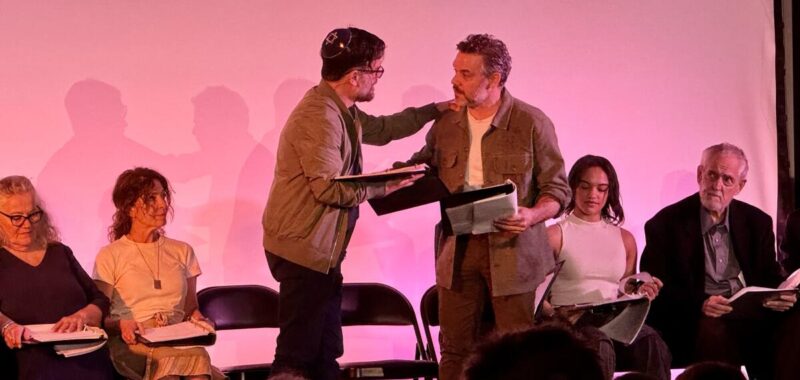
The one-year anniversary of Hamas’ attack on Israel prompted loud protests across Southern California, but in one corner of UCLA on Monday the mood was decidedly different: Before the West Coast premiere of the play “October 7,” which dramatizes the accounts of attack survivors, the audience honored the estimated 1,200 Israelis killed with a moment of silence.
The one-night-only reading, staged in the UCLA Fowler Museum’s Lenart Auditorium, unfolded under heightened security and ongoing tensions over the Oct. 7 attack and subsequent Israeli counterattack that has killed an estimated 41,000 Palestinians. As pro-Palestinian protesters gathered on a different part of UCLA’s campus, the play inside the Fowler proceeded without incident.
Writers Phelim McAleer and Ann McElhinney based the work on their interviews with about 20 survivors of the attack. The married Irish journalists, who live in L.A.’s Venice neighborhood, traveled to Israel in November to gather the accounts. Fourteen of those subjects are represented in the play, read Monday under the direction of Jeff Maynard for a near-capacity audience inside the 324-seat auditorium.
Stories included the testimonials of young people ambushed while they danced at the Nova Music Festival, survivors of a massacre in a kibbutz, grieving parents and rescuers. Actor Josh Bitton said after the performance that he had three family members who were killed and two others who were kidnapped at Kibbutz Be’eri.
“I didn’t know the weight of this until we were reading it,” he said. “It’s been an honor to be a part of this. It feels like one of the only ways I feel like I can do anything.”
The reading was organized by the Dortort Center for Creativity in the Arts at Hillel at UCLA, with co-sponsorship from the UCLA Y&S Nazarian Center for Israel Studies and the UCLA Alan D. Leve Center for Jewish Studies.
“Following the attacks on Oct. 7, our campus faced an unfathomable campus climate that made it very difficult for Jewish students, Jewish faculty and other members of the Jewish community to feel comfortable expressing their Judaism, never mind their connections to Israel,” Dan Gold, executive director of Hillel at UCLA, said to the audience before the reading began. “And so this evening is special for us to mark this terrible 12-month period, both for those in Israel and for everybody here on campus … in a way that honors the victims and shows the Jewish world in Israel that we stand with them.”
“October 7” is in the tradition of the “verbatim play,” a form of documentary theater that uses interviews, court testimony and public remarks to dramatize real events. McAleer previously created the controversial verbatim play “Ferguson,” about the 2014 shooting of Michael Brown by a Missouri police officer, which drew criticism from some who accused McAleer of inflaming tensions rather than providing a nuanced view of the events. Other notable works in the genre include “The Laramie Project,” about the 1998 murder of gay University of Wyoming student Matthew Shepard; “Twilight: Los Angeles, 1992,” Anna Deavere Smith’s retelling of the L.A. riots through the voices of residents and officials; and the forthcoming Off-Broadway transfer “Fatherland,” about a son who tipped off the FBI about his father’s involvement in the Jan. 6 insurrection.
“October 7” premiered in May at New York’s Actors Temple Theatre, with heightened security due to concerns over protests related to the Gaza war and rising antisemitism. The month-long run was incident-free, with only minor tweaks made for the West Coast debut.
Before the reading at UCLA began, Bill Sweeney, assistant director of UCLA’s events office, told the audience that the university supports individuals’ rights to express their views, but protests inside the venue would not be tolerated and could lead to legal consequences, prompting applause. Tensions had been running high on a campus still feeling reverberations from this spring’s demonstrations, which bitterly divided the campus and turned violent when a pro-Palestinian encampment was attacked by counter-protesters. The mayhem, which escalated for three hours, led UC President Michael V. Drake to launch an investigation into the university’s actions and the slow response by law enforcement.
McAleer and McElhinney are in talks to bring their play to other campuses, including in the northeastern U.S. and Ireland. In a Q&A following the reading, McAleer said he and McElhinney had been determined to record the testimonials of Oct. 7 survivors before the world moved on.
“Journalism is supposed to be the first rough draft of history, and no one was writing that draft,” he said. “We were all moving on to Oct. 8, and we knew there would be no Oct. 8 or Oct. 9 without Oct. 7. So we were determined to tell those stories and preserve those stories.”
Actor Ghadir Mounib, who was born in Cairo, said she appreciated that the play included the perspective of an Arab Muslim character.
“We live there,” she said. “We are working in hospitals. We are trying to help. … It’s not us and them.”

